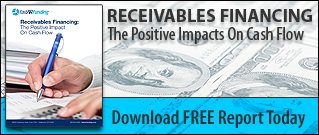 If you’re a small business that has struggled with cash flow because of slow collections on your invoices, you need to consider a factoring program. Factoring is a form of commercial cash flow funding or financing where you sell your company’s accounts receivables to a third party known as a factor.
If you’re a small business that has struggled with cash flow because of slow collections on your invoices, you need to consider a factoring program. Factoring is a form of commercial cash flow funding or financing where you sell your company’s accounts receivables to a third party known as a factor.
Some questions you need to ask when deciding if you need to factor your company’s receivables:
- How long does it take to collect my receivables?
- Do I often find myself having a hard time making payroll?
- Do I often have a difficult time keeping my payables current?
If you find yourself answering 30, 60 or 90 days, yes and yes to the questions above, then I’m sure you’re also seeing your cash flow get tight at times as well.
If you’re doing business with some larger companies, sometimes you won’t get paid for 60 or 90 days. That does not mean your employees are willing to wait that long to be paid and there’s a good chance your vendors probably do not want to wait that long to be paid either.
Here’s the thing, if you discover your company either always has or occasionally has a lengthy operating cycle (the time between purchasing inventory and receiving cash from the sale) resulting in tight cash flow, then you may want to consider setting up a factoring program. Yes, it comes with price, but it’s a small price to pay to ensure your company’s cash flow needs are met.
Trust me, in the years I have been in the commercial finance industry, I have seen how factoring lines have really helped company’s ensure their cash needs are met.
Benefits of a Factoring Program:
There are many benefits to having a factoring line, depending on the factoring company you choose to go with:
- With the advances in technology, factoring lines are easy to establish and some companies offer a paperless factoring option.
- Factoring lines are considered short term. They don’t leave you indebted to a lender for a significant length of time.
- You don’t have to factor every invoice.
- They provide relief for tight cash flow and allow you to meet your Friday payroll and keep your company’s payables current.
Helpful Tips When Factoring Receivables:
There are things to do to make factoring receivables easier for you and the factoring company as well as minimizing expenses. Here are some helpful tips when factoring receivables.
- Factor receivables of creditworthy customers. You may find that the more creditworthy customers will pay faster.
- You may want to calculate what your cash flow needs are and just factor invoices of your more creditworthy customers to satisfy those needs.
- Factors typically verify receivables, have a contact at the customer you know will verify invoices.
As I have said before, during my time in the commercial finance industry serving in various capacities, I have seen how factoring has benefited so many businesses. If you own a small business and discover that you do in fact have a lengthy operating cycle causing tight cash flow, then you should look into establishing a factoring line.
Fast A/R Funding specializes in helping small businesses bridge the cash flow gap with factoring. Download our informative “Factoring 101” guide, or call 888.833.2286 to speak with one of our cash flow consultants.






